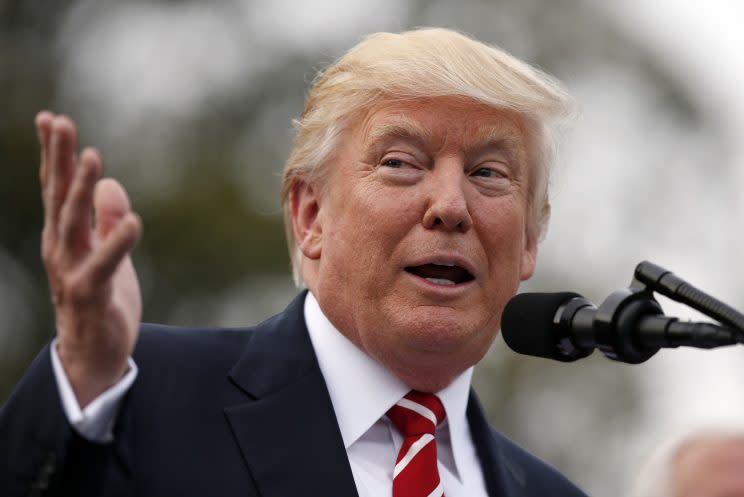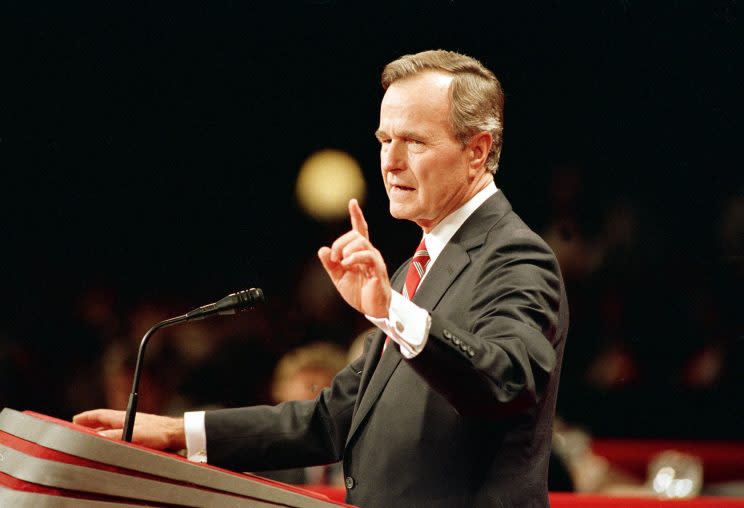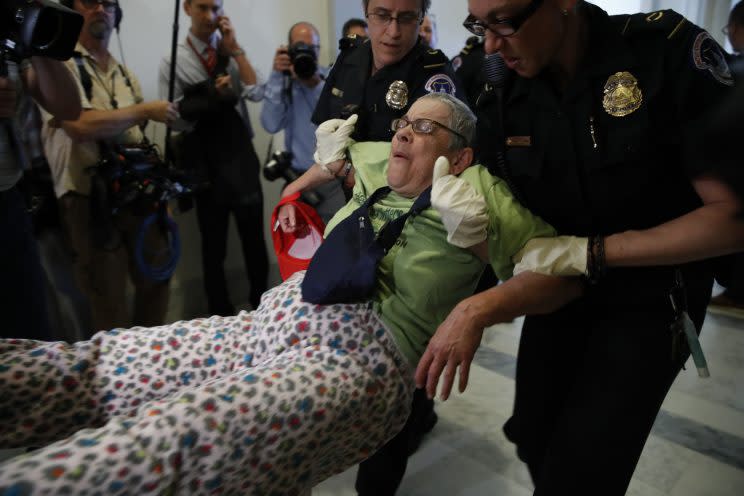Donald Trump is on track to break his promises on Medicaid. It may not be a ‘read my lips’ moment.

WASHINGTON — As the Senate barrels toward a vote on the health care bill that caps per-person Medicaid funding and undoes the expansion of the program under Obama, opponents of the measure point to Trump’s many campaign 2016 statements promising to protect Medicaid.
“I am going to save Medicare and Medicaid,” Donald Trump tweeted in 2015. “The Republicans who want to cut SS & Medicaid are wrong,” he tweeted that July. “Save Medicare, Medicaid and Social Security without cuts. Have to do it,” he told campaign supporters in 2015. It was a position he’d held from the earliest days of his candidacy — and before. “I was the first & only potential GOP candidate to state there will be no cuts to Social Security, Medicare & Medicaid,” he said in May 2015, before formally declaring his presidential bid.
In supporting a bill that cuts Medicaid after promising not to, Trump has made the most significant domestic policy about-face of his young presidency — and what is one of the biggest flip-flops by a Republican president since George H.W. Bush signed a tax increase after pledging, “Read my lips: no new taxes” during the Republican National Convention in 1988.
After Bush set aside that promise in 1990 as part of a budget compromise, he saw his popularity plummet more than 20 percentage points. Support for his presidency rebounded during the Gulf War but then sank again, and during the 1992 campaign Democrats hammered him over his “read my lips” promise as part of building a negative portrait of his political character.
But as much as Democrats plan to run against the Better Care Reconciliation Act’s Medicaid cuts in 2017 and 2018, should they be unable to block the bill this summer, the politics of the situation are sufficiently different that it’s unlikely Trump’s broken promises will hurt him in precisely the same way Bush’s did. And that’s because Bush went against his party in raising taxes, spurring outrage among conservatives — especially an ambitious House member from Georgia’s Sixth District named Newt Gingrich — while Trump’s position finally puts him in sync with his own party, after campaigning on promises that even he acknowledged were outside the mainstream of Republican thinking on entitlement programs.

“[Hillary Clinton] wants to knock the hell out of your Social Security, she wants to knock the hell out of your Medicare/Medicaid. And I’m going to save them, OK?” he said in a speech in Ambridge, Pa., a month before the election. “This is a little reversal for the Democrat/Republican, but I’m going to save them because we’re going to — we’re going to make our country rich again.”
And Trump could scarcely be less popular with Democrats already; with approval numbers once again at 36 percent in the Gallup tracking poll, the only people he has left to lose are Republicans and the minority of independent voters that still signal support.
Trump has been proud of keeping his promises since taking office, regardless of how broadly unpopular they may be, and shows no signs of changing course. (The different versions of the Obamacare overhaul effort have polled as low as 16 and 17 percent.) When Trump rallied in Iowa last week, the arena was decorated with signs announcing “Promises Kept.”
The big question is how the base Republican voters who backed Trump will take this shift in policy. “If the endgame is to save money, [the GOP] might be on the right track. But that’s not the endgame that Donald Trump campaigned on,” former Arkansas governor and staunch Trump supporter Mike Huckabee said Monday.
The BCRA’s changes would rapidly alter the individual insurance market, and much of the projected rise in the number of uninsured by 2018 will come from a sharp decline in the number of people signing up in that market in order to avoid fines, according to the Congressional Budget Office. The changes to Medicaid are back-loaded and will have the most on-the-ground impact starting in 2021, but would ultimately lead to $772 billion in spending cut from the program.
A number of analyses have found that Trump voters who choose to stay insured and are in the individual market are most likely to be hit by the changes to the plans offered there.
Medicaid is the primary source of medical coverage for more than 70 million low-income Americans, including two-thirds of the elderly in nursing homes and nearly 40 percent of children.

A PARTY FOR THE WEALTHY? All that said: Progressive advocacy group Priorities USA on Monday released a poll showing that there has been a slide in how voters view Trump since his election. “To an extent unseen in past polling, voters see Trump as siding with the wealthy and big corporations over regular people,” pollsters working for the group wrote. “In a similar survey in January, our post-election survey showed considerably more Obama-Trump voters believed Democrats to favor the wealthy more than Trump did. Health care appears to be a key factor behind this trend.”
The pollsters reported that “Obama-Trump voters are exactly the kind of voters most likely to be persuaded by Democratic messaging about the Republican health care bill” and suggested that “health care remains the most effective wedge that could potentially bring these persuasion targets back into the Democratic fold.”
Unsaid: The American people have an enormous bias against disruption in the health care sector, even as they frequently express a desire for change to it. It took until April 2017, when Obamacare was under threat of being repealed under Trump, for the law to register majority approval for the first time in Gallup polling that had been ongoing for five years.
CALL YOUR SENATOR, SAY U.S. SENATORS. Here’s a sign of just how cut out of the conversation on health care legislation Democratic senators have been: High-profile U.S. senators have been reduced to urging their constituents to call their colleagues across the aisle.
This weekend we must keep up the pressure on the Republican “health care” bill. Make those calls.
— Kamala Harris (@KamalaHarris) June 24, 2017
Remember: The health care bill isn’t over until the bill is dead. If we raise our voices together, we can win this fight — (202) 224-3121.
— Kamala Harris (@KamalaHarris) June 26, 2017
Pick up your phone. Call your Senator. Tweet them. Write them. Do it now. pic.twitter.com/MEuRRqfBx7
— Chris Murphy (@ChrisMurphyCT) June 25, 2017
RING-AROUND-THE-CAPITOL. Planned Parenthood is planning to encircle the U.S. Capitol on Wednesday with a “human chain” in a protest of the BCRA.
____
Read more from Yahoo News:




